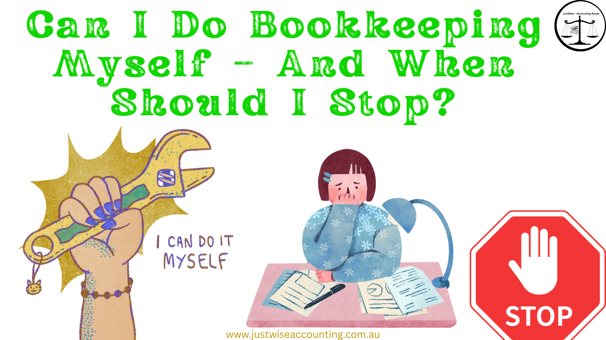
Can I Do Bookkeeping Myself – And When Should I Stop?
Wondering if you can do your own bookkeeping? Learn when DIY bookkeeping works, when it doesn’t, and what options suit small business owners best.
Justwise Accounting
2 min read


Can I Do Bookkeeping Myself – And When Should I Stop?
As a small business owner, you may be wondering: “Can I do my own bookkeeping?” The short answer is yes — but it depends on your stage of business, time capacity, and financial confidence.
DIY bookkeeping is a common path for start-ups and sole traders. It’s budget-friendly and gives you full visibility into your finances. But as your business grows, so does the complexity — and the potential cost of mistakes.
What Does a Bookkeeper Do for a Small Business?
Before deciding whether you can manage it yourself, it helps to understand what a bookkeeper actually does. For small businesses, bookkeepers typically:
Record day-to-day income and expenses
Reconcile bank and credit card transactions
Track accounts payable and receivable
Categorise expenses correctly (essential for accurate tax claims)
Prepare basic financial statements like profit and loss reports
Manage BAS preparation, if qualified
Set up software workflows and invoice systems
When done well, these tasks form the financial backbone of your business.
Can I Do Bookkeeping Myself?
If your business is in its early stages, and you have the time and discipline, DIY bookkeeping can work, especially if:
You only have a handful of transactions each week
Your structure is simple (e.g. sole trader, no payroll)
You’re comfortable using software like QuickBooks, Excel, or MYOB
You keep your receipts well-organised
You understand your tax obligations (or work with an accountant for review)
For many new business owners, bookkeeping in Excel is a common starting point — but it can quickly become inefficient as things scale.
Is It Worth Getting Xero or QuickBooks?
Absolutely. If you're going to handle your own books, investing in a user-friendly, cloud-based tool like Xero can save you hours of admin. Benefits include:
Bank feeds that automate transaction imports
Real-time invoice tracking
BAS reporting capabilities
Secure cloud storage for receipts
Seamless collaboration with your accountant or bookkeeper
Many business owners begin with Xero’s Starter plan, which is affordable and scalable. Some accountants also offer Xero subscriptions as part of a bookkeeping package, removing the need to manage it separately.
Is There a Free Bookkeeping Software?
Yes — but free tools often come with limitations. Examples include:
Wave Accounting – free for basic invoicing and tracking
Excel templates – customisable but completely manual
Zip Books (free tier) – limited features and may not suit Australian tax needs
While these can work for side businesses or freelancers, they typically lack:
ATO-ready BAS functionality
Local support and payroll tools
Integration with bank feeds
If you're serious about growing your business, consider your time as a cost, and choose a tool that will scale with you.
When Should You Stop DIY Bookkeeping?
As a rule of thumb, you should stop doing your own bookkeeping when:
You’re spending more than 2–3 hours per week on admin
Your transactions exceed 30–50 per month
You start missing deductions or compliance deadlines
You feel unsure about GST, PAYG, or BAS obligations
You’re earning enough that your time is better spent growing the business
Many owners continue DIY far longer than they should — costing them time, tax deductions, and peace of mind.
Final Thoughts
Yes, you can do your own bookkeeping. But the real question is: should you?
When you're just starting out, DIY bookkeeping helps you stay close to your numbers. But as your operations grow, outsourcing to a bookkeeper ensures compliance, accuracy, and time saved.
Justwise Accounting works with business owners who started out managing it all — and are now ready to let go of the books and focus on growth.
Stay in Touch
© 2025 JustWise Accounting. All rights reserved. ABN 85 581 353 385
⚠️ We respect your privacy. Unsubscribe anytime. (under subscribe button)
Serving Australia-wide
Justwise acknowledge the Traditional Owners of the lands where we operate and pay respect to Elders past and present.
